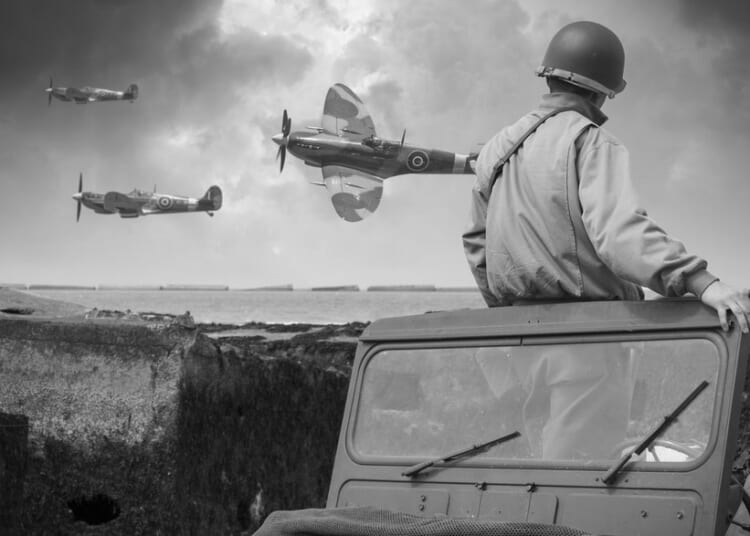WRITING recently in TCW, I told how the new Steven Spielberg / Tom Hanks television series Masters of the Air highlights the allegedly fraught relationship between American and British bomber crews during the Second World War.
Undoubtedly there were such transatlantic tensions. However, with their troops pouring into this country from 1942 onwards to prepare for D-Day, officials at the US War Department did their best to make the culture clash as trouble-free as possible. One of their main efforts was issuing GIs with a seven-page foolscap leaflet called Instructions for American Servicemen in Britain.
It’s available in reprint as a booklet and makes fascinating reading, not least for its straightforward, jargon-free writing style and its overriding message – telling the Yanks to use ‘plain common horse sense’ in their dealings with the British.
In parts, it now seems clumsy and condescending. But its purpose was praiseworthy – to try to get American troops to damp down the impression that they were overpaid, oversexed and over here. Many GIs qualified in all three aspects, of course, but you couldn’t blame the top brass for trying.
The leaflet paints a sympathetic (some would say patronising) picture for the incoming Americans of a Britain – ‘ a small crowded island of forty-five million people’ – that had been at war for three years, having initially stood alone against Hitler and braved the Blitz. Hence this ‘cradle of democracy’ was now a ‘shop-worn and grimy’ land of rationing, the blackout, shortages and austerity. But beneath the shabbiness, there was steel.
‘The British are tough. Don’t be misled by the British tendency to be soft-spoken and polite. If need be, they can be plenty tough. The English language didn’t spread across the oceans and over the mountains and jungles and swamps of the world because these people were panty-waists.’
There were helpful hints about cricket, football, darts, pounds, shillings and pence, warm beer and badly-made coffee. And because we are two nations divided by a common language, the Yanks were urged to listen to the BBC.
‘In England the “upper crust” speak pretty much alike. You will hear the newscaster for the BBC (British Broadcasting Corporation). He is a good example, because he has been trained to talk with the “cultured” accent. He will drop the letter “r” (as people do in some sections of our own country) and will say “hyah” instead of “here”. He will use the broad “a”, pronouncing all the a’s in “banana” like the “a” in father.
‘However funny you may think this is, you will be able to understand people who talk this way and they will be able to understand you. And you will soon get over thinking it’s funny. You will have more difficulty with some of the local accents. It may comfort you to know that a farmer or villager from Cornwall very often can’t understand a farmer or villager in Yorkshire or Lancashire.’
The GIs were warned against bravado and bragging, being told that the British were reserved but not unfriendly. ‘They will welcome you as friends and allies, but remember that crossing the ocean doesn’t automatically make you a hero. There are housewives in aprons and youngsters in knee pants in Britain who have lived through more high explosives in air raids than many soldiers saw in first-class barrages during the last war.’
However, while the Yanks were indisputably over here, the issues of being oversexed and overpaid were not tackled in depth. ‘You will naturally be interested in getting to know your opposite number – the British soldier, the “Tommy” you have heard and read about. You can understand that two actions on your part will slow up the friendship – swiping his girl and not appreciating what his army has been up against. Yes, and rubbing it in that you are better paid than he is.
‘American wages and American soldiers’ pay are among the highest in the world. When payday comes it would be sound practice to spend your money according to British standards. The British “Tommy” is apt to be specially touchy about the difference between his wages and yours. Keep this in mind. Use common sense and don’t rub him up the wrong way.’
British soldiers were indeed badly paid compared with the Americans, and with Canadians and Australians. A British private could be on just two shillings (10p) a day (14s or 70p a week), while his US equivalent was getting five shillings daily. What particularly riled many of our troops was that they earned a lot less than British factory workers. Even the lowest-paid munitions workers could be on £2 (40 shillings) a week, while some highly-skilled tradesmen, working weekends and nights, could earn an astronomical £25 (500 shillings) a week.
One Conservative MP, Captain Alec Stratford Cunningham-Reid – a First World War fighter ace – took up the soldiers’ case, urging the Government to raise a private’s wages to 5s (25p) a day. He told the Commons: ‘The British private often finds himself in a humiliating position when he meets soldiers from other countries. In the part of the world where I live, the ordinary British private will not go into a pub if privates from other countries are there. It is not that they do not like them, but if they go in they are not able to hold their own when it comes to a round of drinks.
‘The soldiers hear such propaganda slogans as “equality of sacrifice” and that “we are all in the front line”. What rubbish that is! How can it be claimed that the reserved war industry worker, or any civilian, is making equal sacrifices with the man in the fighting services?’
Despite such pleas from many quarters, British troops’ pay rose only marginally in the ensuing years. Although he ended up sharing victory on the battlefield, the poor Tommy never came close to winning the wage war with the ‘overpaid’ Yank.











